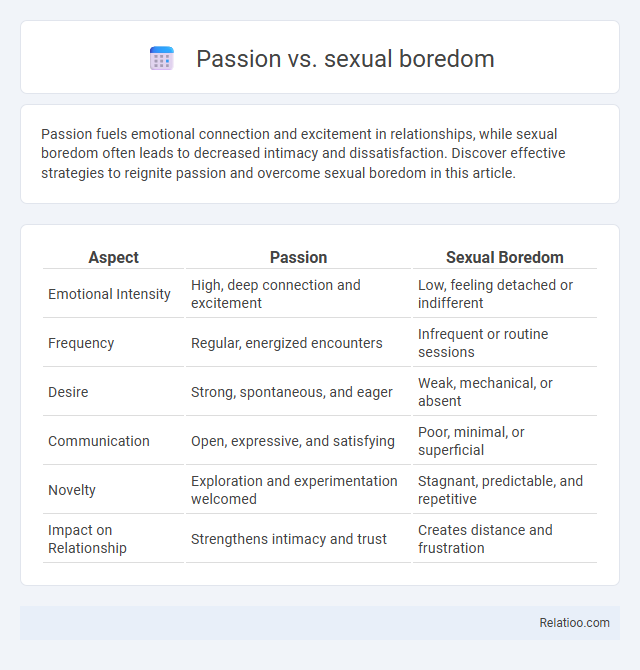Passion fuels emotional connection and excitement in relationships, while sexual boredom often leads to decreased intimacy and dissatisfaction. Discover effective strategies to reignite passion and overcome sexual boredom in this article.
Table of Comparison
| Aspect | Passion | Sexual Boredom |
|---|---|---|
| Emotional Intensity | High, deep connection and excitement | Low, feeling detached or indifferent |
| Frequency | Regular, energized encounters | Infrequent or routine sessions |
| Desire | Strong, spontaneous, and eager | Weak, mechanical, or absent |
| Communication | Open, expressive, and satisfying | Poor, minimal, or superficial |
| Novelty | Exploration and experimentation welcomed | Stagnant, predictable, and repetitive |
| Impact on Relationship | Strengthens intimacy and trust | Creates distance and frustration |
Understanding Passion in Long-Term Relationships
Understanding passion in long-term relationships helps you maintain emotional intensity and physical desire despite routine challenges. Sexual boredom often arises from repetitive behaviors, while distinguishing it from deeper sexual dissatisfaction allows couples to address underlying issues effectively. Cultivating new experiences and open communication revitalizes passion and prevents sexual boredom from undermining intimacy.
Defining Sexual Boredom: Signs and Causes
Sexual boredom manifests through a decline in desire, repetitive routines, and lack of stimulation, often signaling unmet emotional or physical needs. Common signs include decreased enthusiasm for sexual activity, a preference for distraction or avoidance, and diminished intimacy with partners. Causes range from relationship dissatisfaction and stress to hormonal changes and inadequate communication, requiring mindful attention for resolution.
The Psychological Roots of Passion and Desire
Passion and sexual boredom stem from distinct psychological roots that deeply influence your desire and intimacy. Passion arises from emotional connection, novelty, and dopamine-driven excitement, while sexual boredom often results from routine, lack of emotional engagement, and diminished serotonin levels. Addressing these differences can enhance your understanding of desire and reignite intimacy by targeting the underlying psychological factors.
How Routine Can Lead to Intimacy Stagnation
Routine in intimate relationships often leads to sexual boredom by reducing novelty and excitement, which are crucial for maintaining passion. Repeated patterns and predictable encounters can cause emotional disengagement, resulting in intimacy stagnation. Introducing varied experiences and open communication helps counteract boredom and revitalizes the connection between partners.
Communication: The Bridge Between Passion and Boredom
Effective communication is the key to navigating the delicate balance between passion and sexual boredom, enabling you to express desires and address concerns openly. Clear dialogue fosters emotional intimacy, reigniting passion by preventing misunderstandings and unmet expectations. Maintaining ongoing conversations about your needs and boundaries transforms monotony into connection, strengthening the relationship's vitality.
The Role of Novelty in Sustaining Sexual Excitement
Sexual excitement thrives on novelty, as the brain responds to new experiences by releasing dopamine, enhancing passion and intimacy. When sexual boredom sets in, predictable routines reduce stimulation, leading to decreased desire and emotional connection. To sustain your passion, introducing fresh activities and exploring desires can reignite excitement and prevent the stagnation of sexual boredom.
Emotional Connection and Its Impact on Sexual Satisfaction
Emotional connection significantly influences the balance between passion and sexual boredom, with strong intimacy often enhancing sexual satisfaction by deepening trust and vulnerability. In relationships lacking emotional depth, sexual experiences may decline into sexual boredom, characterized by routine and disengagement that reduce overall fulfillment. Prioritizing emotional bonding fosters sustained passion, which counters the stagnation of sexual boredom and elevates mutual pleasure and desire.
Myths About Passion Fading Over Time
Passion fading over time is often misunderstood, with many myths suggesting it inevitably leads to sexual boredom, which is not accurate. Research indicates that passion can evolve rather than disappear, influenced by emotional intimacy and communication rather than solely physical excitement. Maintaining vibrant sexual experiences depends on mutual effort, novelty, and emotional connection, debunking the myth that passion must decline irreversibly.
Strategies to Rekindle Passion in the Bedroom
Rekindling passion in the bedroom involves strategies such as open communication, exploring new activities, and setting aside dedicated intimate time to break sexual boredom. Introducing variety through role-playing, sensual massages, or trying new positions can reignite excitement and deepen emotional connection. Consistently prioritizing physical and emotional intimacy fosters sustained desire and combats the stagnation caused by sexual boredom.
Embracing Change: Creating a Fulfilling Sexual Journey
Passion often ignites excitement and deep connection in your sexual journey, while sexual boredom can arise from repetitive routines and lack of novelty. Embracing change by exploring new experiences, open communication, and experimenting with fantasies revitalizes intimacy and prevents stagnation. Creating a fulfilling sexual journey requires conscious effort to balance desire and variety, ensuring lasting satisfaction and emotional closeness.

Infographic: Passion vs sexual boredom
 relatioo.com
relatioo.com